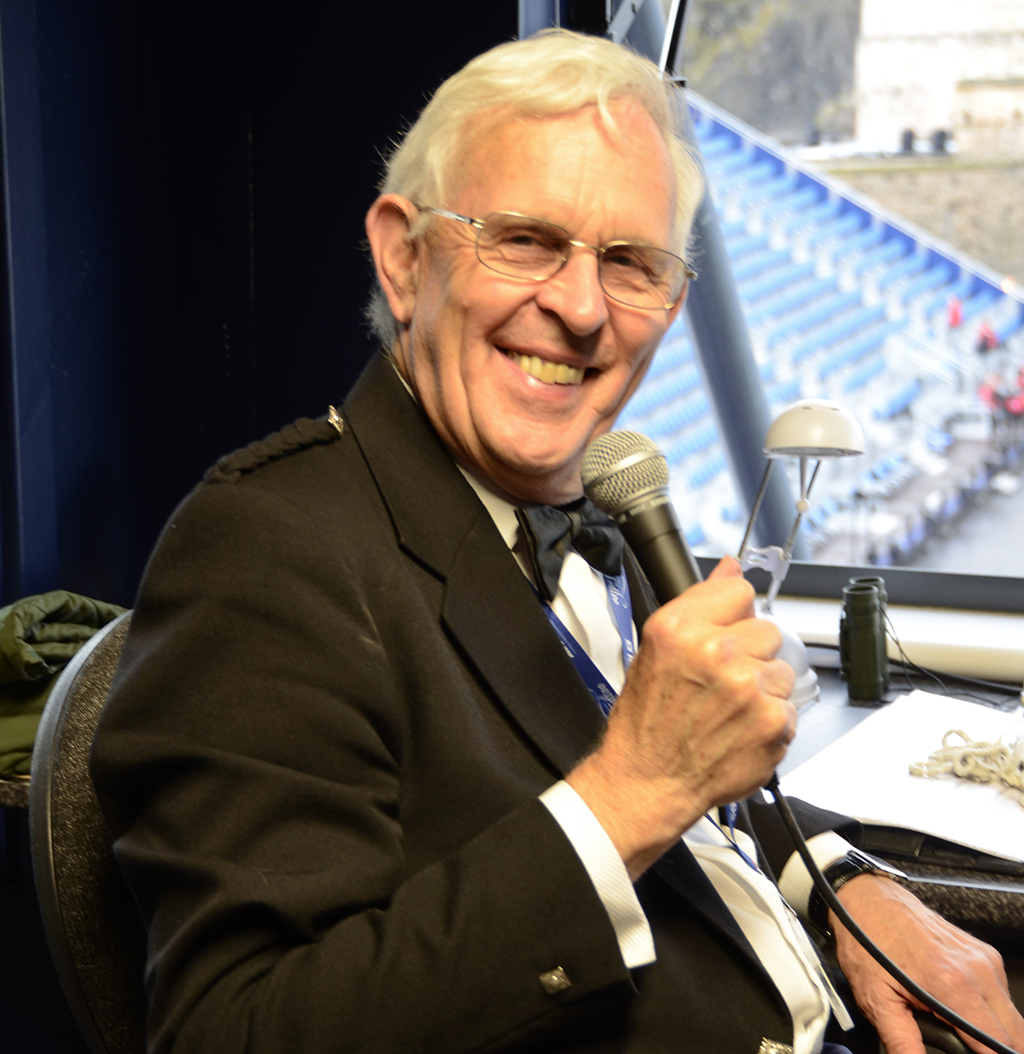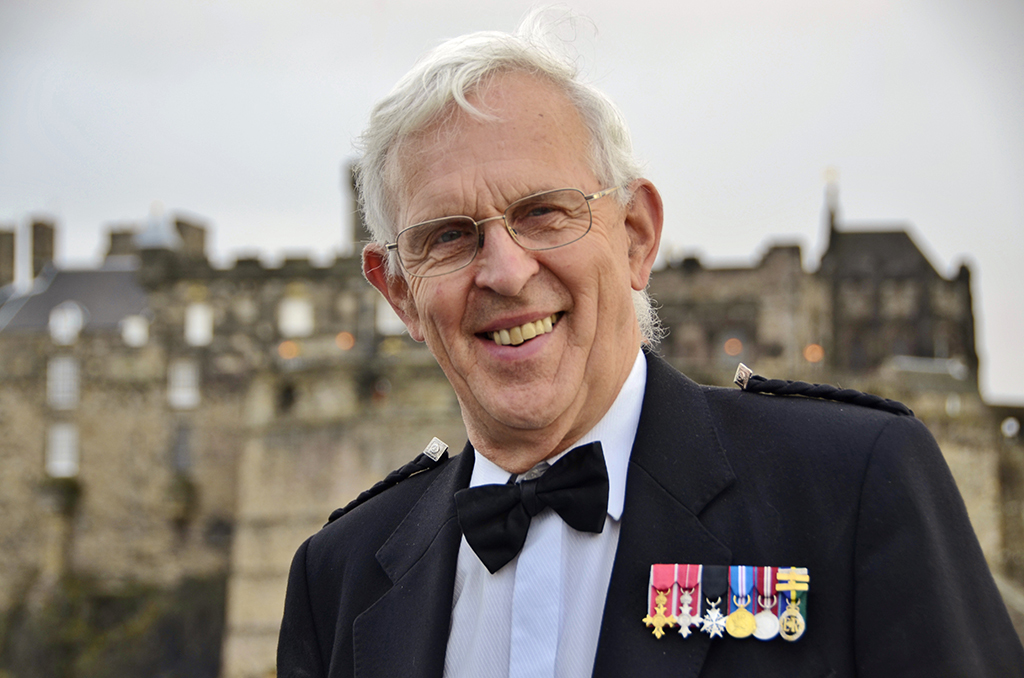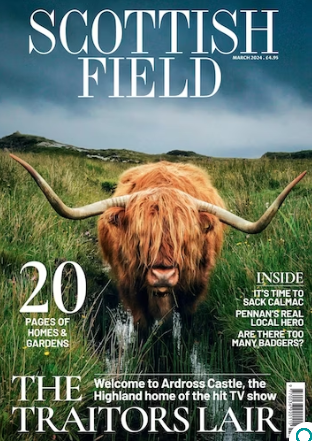
Dedication of the voice of the Military Tattoo
The voice of The Royal Edinburgh Military Tattoo since 1992, Alasdair Hutton OBE tells the story of ‘the greatest show on earth’ each August.
Despite claiming to have only been given the job as script writer and narrator of the Royal Edinburgh Military Tattoo ‘because they were desperate,’ Alasdair certainly has the military savvy for the job.
As well as having been a BBC announcer, he also has a total of 35 years in the military, 22 in the Parachute Regiment TA, 10 in the Central Volunteer Headquarters and three as an Honorary Colonel in the Lothian and Borders Army Cadet Force.
However, it was almost by chance that Alasdair became ‘the voice of the Tattoo.’
He explains: ‘They were desperate. At the end of 1991, the producer Lt Col Leslie Dow, who had been doing the narration for the previous 16 years, was taken ill and decided that he had to retire.
‘So a new producer was found – a chap called Michael Parker, who is now Sir Michael Parker who was really the best of the big royal event producers in Britain, but he didn’t know anyone in Scotland and narrators are few and far between. He asked the BBC outside broadcast producer Ian Christie if he knew anybody and he, being super-intelligent, thought of me!
‘I’d never done anything like this before, but I had been a BBC announcer and a TA Paratrooper and Ian thought that might work.
I’ve been doing it ever since, but it was odd because I have never done anything like it but I think Michael was actually really desperate at that point!’
Alasdair writes the script well in advance of August, but intensive rehearsals don’t start until the Monday before the opening night on Friday.

Alasdair at the microphone, ready to narrate the Tattoo
He explained: ‘I write the script and then read it. I don’t need to memorise it as I’m out of sight.
‘I have to rehearse. Rehearsals for the tattoo start at 7 o’clock on the morning of the Monday of the week of which the tattoo starts on the Friday. So we rehearse intensively from 7am to 11pm on the Monday and Tuesday then there are two public rehearsals at Redford Barracks on the Wednesday and Thursday, the two more at night up at the castle. The second of those is always a public performance, but it’s just a dress rehearsal really and that’s it.
‘I watch the rehearsals for the first day or two to see if the narration will fit. If it doesn’t I can adjust it. So I start doing the narration from the Tuesday night or Wednesday morning. It is quite last minute, but I will have been discussing the script and writing it for months before rehearsals begin.
‘I think the biggest challenge is making sure that the narration sets the right mood for the tattoo. The producer has in his mind an idea of what he wishes to convey to the public so he and I need to discuss what that idea is and then I need to translate that into the words that will convey the right mood for the audience.’
Something that Alasdair has to do is ensure he is polished.
He explained: ‘The tattoo never makes mistakes, it’s the greatest show on earth. Because it’s a military show featuring military personnel its very rare when anything doesn’t just work. It is extraordinary how accurate it is every night. Most of the difficulties arise from the weather.
‘You can occasionally have the north sea haar that rolls up the Forth. Once we had to cancel the fireworks because you couldn’t see two feet above the ground. So you would have spent £20,000 and nobody would have seen them. The wind is a big factor because if it’s above 23 knots it will blow the sparks from the fireworks into the audience.
‘Rain has the potential to affect some acts like the gymnasts. They can’t grip their equipment. A drill display team can be affected by rain too as their rifle stocks and butts can be slippery. If you’ve a drill team doing an overhead rifle toss that can be affected by the wind. These teams use real bayonets and people have been injured by them, they’re not toys.
‘My military background helps me to understand what’s going on which makes the writing easier. I speak ‘soldier speak’ so the people know that I know what they’re doing. Nothing is lost in translation. I was in the military for 35 years – 22 in the parachute regiment TA and 10 years in an organisation called the central volunteer headquarters, still badged to the parachute regiment – attached to the first division based in Germany, then I was honorary colonel of the Lothian and Borders Army Cadet force for three years.

Alasdair Hutton at Edinburgh Castle
‘Clarity makes a good speaker. At the Tattoo you have huge audiences from all over the world and many of them do not speak English as their first language. So whatever the speaker is saying needs to be said clearly, but it can’t be slow and dull – you’ve somehow got to be able to create the mood, pace and atmosphere but do it in such a way that people can hear it and understand what you’re saying. Clarity is vital but so is the mood and tone of voice. You have to convey to the audience in very few words whether you should be happy, sad, excited, apprehensive or whatever.
‘I don’t have a secret formula to keeping my voice sounding good. Any fool could do it!’
Despite having been the voice of the Tattoo for so long, it still keeps Alasdair on edge.
He said: ‘I do get nervous before a show, but that’s essential really. When I was commanding paratroopers I wanted them to be nervous before they jumped, because if they are not sick with nerves but just a little bit on edge, they would be more alert, more careful – you do not want people who are idle and blasé and who take things for granted. In an aircraft that’s dangerous.
‘It’s the same doing a show. You ought to be a little apprehensive before you start to keep you sharp. It comes down to a little bit of adrenaline.
‘The other thing you might wabnt to mention is that I try to get the audience in the right mood before the show starst. I try to welcome people individually or by country.
‘A lot of people send me little notes becase they want a mention for their friends or family – if there’s a birthday. The producer and I believe that it plays an important part in getting the audience in the right mood to start the show. People want to be involved – I’m a very bad singer but I will sing happy birthday to someone and ask the audience to drown me out by singing it themselves.
‘Everyone likes to cheer their own countries and sometimes individuals like to jump up and wave their arms when there name is called out. I’m trying to make everyone feel like they’re part of the show rather than just sitting there watching. That’s quite an important part of the Tattoo and I’ve worked that up over the years as a way of including people so that when the show starts everyone is warmed up and feeling comfortable with and break the ice with the people sitting around them.
‘So I’m working around 25 minutes before the show starts. The salute taker is given a Gaelic greeting and a quaich of whisky, it all happens before the show, but it’s very important.’
TAGS

